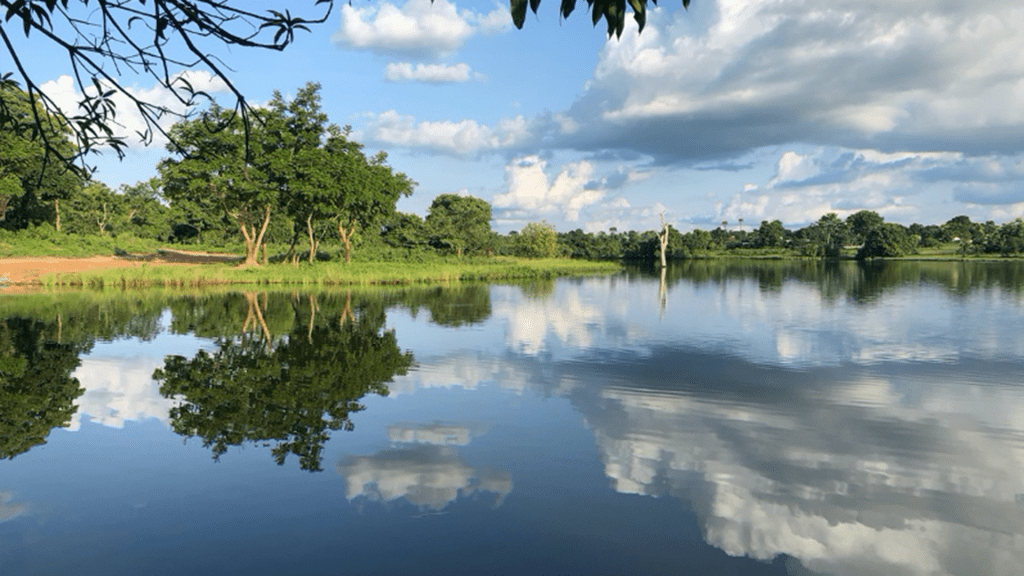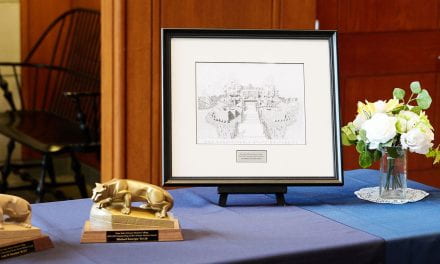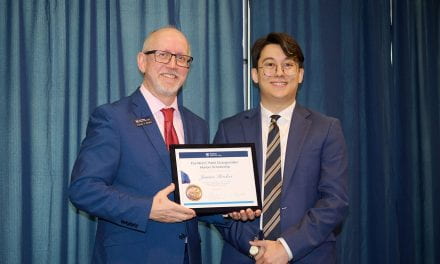Research plays an integral role in every Schreyer Scholar’s journey through the Honors College. With it, they create a deeper understanding of topics that interest them; it helps them build skills that will be useful in post-undergraduate life; to be successful at it they learn to build partnerships and rely on others for help; and, ultimately, share their research findings with the world by completing a thesis.
The combination of Schreyer’s interdisciplinary nature, the academic freedom that Scholars enjoy and the resources that Penn State offers creates nearly limitless opportunities for unique research experiences. For a handful of Scholars, their unique opportunity meant traveling thousands of miles from University Park in spring 2024 to work on deeply impactful, environment-focused projects.
Olivia DiPrinzio, Carolyn Mole and Ben Lindgren each spent two weeks abroad on research projects that are part of a collaboration between Schreyer and Penn State Global. The initiative is designed to connect Scholars with faculty members whose research extends beyond the U.S.’s borders and lines up with the student’s area of interest. Sarah Lyall-Combs is Schreyer’s coordinator of academic and international programs and played a large role in making the partnership possible. Her efforts helped send the first Scholars on research abroad trips over Thanksgiving break in 2023.
“This program is kind of built around a pre-existing structure that pairs a Penn State faculty member with an international faculty member on research at a strategic location overseas,” said Lyall-Combs. “Penn State Global Programs awards seed grant funding to faculty based on submitted proposals. Those grants make the international research projects possible.
“Based on the projects that are funded, the Honors College reaches out to Scholars to invite them to participate through its interest subscription lists,” Lyall-Combs continued. “We provide faculty who work with Scholars on research abroad funds to help with project expenses and we fund the Scholars who participate, as well.”
That funding, along with the faculty whose projects matched their interests, paved the way for DiPrinzio, Mole and Lindgren to travel to Oceania last spring for work on environment-focused research. February saw DiPrinzio trek to New Zeland to collaborate with faculty from the University of Auckland while Mole and Lindgren went to Australia and researched alongside Monash University faculty.
Penn State established formal strategic partnerships with the University of Auckland and Monash in 2018 and 2017, respectively.

Striving for Environmental Equity
As a high school student in Lansdale, Pennsylvania – about three hours east of University Park – Olivia DiPrinzio wanted to expand her horizons by attending college away from her home state. She grew up with two aunts whose experiences moving often as children and backpacking through Europe as young adults stoked her eagerness to explore the world.
After exploring her options, though, DiPrinzio was drawn to what Penn State and Schreyer Honors College had to offer, especially the support for educational experiences abroad. The Covid-19 pandemic waylaid her initial plans for the start of her Penn State career as she attended all her first-year classes remotely. She couldn’t have known it at the time, but the path DiPrinzio was forced to take altered the trajectory of her Schreyer journey and put her on track to travel farther from Lansdale than she’d ever been.
“I started as a computer science major but my parents saw, especially because I stayed home that first year, that I wasn’t happy or fulfilled with what I was doing,” DiPrinzio said. “It just wasn’t for me and they helped me think about trying something else.
“Growing up where I did, I definitely started to see some influences of climate change. I felt like I wanted to do something about it, so I switched to double majoring in energy engineering and earth science and policy,” she continued. “Maureen Feineman helped me so much during my transition into the College of Earth and Mineral Sciences. To this day, she’s still my advisor and she has been one of the most influential people on my academic career here.”
A year after making the switch to the College of Earth and Mineral Sciences, DiPrinzio began a climate, science and education internship with Penn State Sustainability. There she connected with Peter Buck, affiliate faculty and associate director of climate and sustainability education. During their work together, Buck mentioned to DiPrinzio that he had applied for a seed grant to work with faculty at the University of Auckland on climate action plan research.
“I knew my thesis was going to be on climate action plans so I asked if there was any chance I could go,” said DiPrinzio. “He said, ‘I don’t know but we’re going to look.’ Then, Schreyer heard about the seed grant and reached out [to Buck] and said they wanted to send a Scholar.”
“Dr. Buck replied that I would be a perfect fit because I am in Schreyer and because of my experience with sustainability learning outcomes and climate action plans,” she continued. “Then the financial and planning support that Schreyer and Penn State offered made that part of the experience pretty easy.”
The team from Penn State that went on the trip included DiPrinzio, Buck, Brandi Robinson, associate teaching professor in energy and sustainability and Erica Smithwick, distinguished professor of geography and ecology. While there they collaborated with George Perry, professor of environment, James Brock, lecturer in ecology, 3 Phd students, a master’s degree student and an additional staff member from the University of Auckland.
Despite all the academic experience around her, DiPrinzio never felt out of place.
“There was commentary about how it was surprising that I was there as an undergrad. But it was never said in a negative way. They were like, ‘This is wonderful. How did you get to do this?’ I never got treated differently which was great because I’m not an ecologist. That’s not my training at this point.”
Olivia DiPrinzio
“It really was wonderful to learn from the team,” she continued. “We would be in these settings that are very informal but I’m still getting that educational component while making these personal connections. I consider them all friends at this point.”
The team’s work focused on the city of Auckland’s climate action plan, which is considered a standard bearer in the sustainability community. DiPrinzio came to learn that it was not just the plan’s ambition, but the intent with which it was built that set it apart.
“One of the things that really struck us was that the plan was very detailed,” she said. “We got to talk with Maori community leaders in the Northland and learn about their experience with the plan’s development. We saw how the different political, social, economic, and environmental situations all wrapped up in these plans. That gave us a more realistic view [of the plan’s impact].”
Since returning from New Zealand, DiPrinzio has been working on finishing her coursework and thesis and intends to graduate in fall 2024. Her post-undergraduate plans include graduate studies in environmental policy followed by an environmental law degree. She hopes that educational background will pave the way for a career developing policies that would reduce inequalities within and between nations and people, climate planning and clean energy deployment.
DiPrinzio’s experience with research abroad, she believes, will have a lasting impact in the near term and long after she leaves Penn State.
“With my thesis, the end goal is to create a working document that local communities, especially those that are understaffed and don’t have the resources to create climate action plans, will be able to use this thesis as a resource,” she explained. “It will include the community engagement I observed in New Zealand and how it can be implemented in the U.S.
“The thesis will be a case study of the climate action plans from Northland, Auckland and possibly either Christchurch or Wellington,” DiPrinzio continued. “It’s a big thesis. There is no way that reading those plans here in Pennsylvania that I would have ever understood them like I do now. I think the amount of benefit that’s going to give my thesis is invaluable.”

Teaming up to tackle land use challenges
As friends at North Allegheny High School in suburban Pittsburgh, Ben Lindgren and Carolyn Mole had not envisioned themselves traveling the world together for scholarly research. Yet, that’s exactly where they found themselves at the end of their second year as Schreyer Scholars.
Their trip to Monash University in Melbourne, Australia was centered around understanding research design and methods used for studying effective, sustainable land usage in the U.S. and Australia. Both Scholars are rising third-years with Lindgren double majoring in community, environment and development and international politics, and Mole majoring in energy business and finance. Their disciplines allow them to tackle sustainability issues from different angles, and they came to their interest in the topic in vastly different ways.
“I’ve always been very interested in environmental and agricultural systems as a kid,” said Lindgren. “I had a garden growing up and I helped run food drives at my high school. So, learning about food systems has always been a priority for me.
“I’ve really translated that into my majors, because food systems issues are global in nature. And we see that going from farms to the trade of food into how food is regulated. So that all ties into my land management and food system studies now.”
Mole, though, took a bit longer to find an enthusiasm for environmental work.
“I’ve had a rapidly growing interest in sustainability since I got to Penn State,” she said. “I switched my major multiple times freshman year. I really wasn’t sure what I wanted to do, but I kind of developed an interest in sustainability through my Sustainability 200 course. It really opened my eyes to how many applications sustainability has.
“After that class I developed an interest in the energy industry, and that’s why I switched to energy business and finance,” Mole continued. “I really hope to work in the energy industry and renewables, and promote sustainable and renewable energy.”
While they both have different long-term goals for what they want their work with environmental causes to look like, Lindgren and Mole found an organization at Penn State with international reach that can help them make an impact now.
In August of 2023, they were introduced to Youth as Researchers, which is offered by the United Nations Educational, Scientific and Cultural Organization (UNESCO) throughout the world. The program aims to empower students to lead research projects that will enhance their skills and let them investigate issues for which they can drive change.
Lindgren and Mole joined Youth as Researchers in student co-investigator roles where they manage a team of four Penn State students who are researching social science issues related to sustainable land usage in State College.
“We’ve been able to help them understand effective research design and similar topics,” said Lindgren.
“We meet weekly and get them to have conversations about what topics interested them and what they wanted to get out of research. Then we’d help them plan their final project,” added Mole. “They decided to do it under the umbrella of climate justice, and issues specific to State College. Since this is a college town, they had an interest in how the perspective of land uses varies from locals who live in state college and students.”
Their faculty research advisor, Mark Brennan, professor and UNESCO chair on global citizenship education for sustainable peace through youth and community engagement, oversees Youth as Researchers and Penn State’s partnership through the program with Monash University. His collaboration with faculty at Monash helped a Youth as Researchers team take on a project similar to Lindgren’s and Mole’s where the students investigated land usage issues in Australia.
The cooperation between the universities set the stage for Lindgren and Mole to take on their research abroad experience. As Lindgren explained, they were both excited for the trip because of how it differs from typical study abroad opportunities.
“In an embedded course, you’re coming in more as, I think, as more of a passive learner. You’re taking information in through in-person visits to sites or classroom lectures,” he explained. “For us in Australia, we’re contributing to those conversations. Through research, we’ll be sitting in on meetings and workshops, contributing to what we’ve learned this spring while learning at the same time.”
Ben Lindgren
“In Monash, we shared the details from our Youth as Researchers project here with their team,” added Mole. “Ben and I talked with them about our experiences as co-investigators, and what it was like conducting those trainings with the students. Then we also heard their ideas on the project, and how they went about their research.”
Gaining the international perspective on research methods and land usage was especially impactful for Lindgren, given his international politics major.
“It’s truly amazing to see how research is conducted in a comparative way,” he said. “Coming from an American perspective, it’s wonderful to gain an understanding of the contrasts with the Australian perspective because how we use our land sustainably is quite different.
“With my studies [at Penn State], I get to explore U.S. land management and agricultural practices, which I love. But Australia does things very differently. In some respects, it has unique issues that often relate to climate change and biosecurity, and they have their own worries. I think being able to broaden my mindset on what sustainable agriculture looks like, what sustainable land usage looks like is so valuable for my later career. And I am so grateful that I’ve had the opportunity to just broaden my horizons in that topic.”
Upon returning to the U.S. from Australia in mid-May, Lindgren and Mole were able to spend some time reflecting on their trip and preparing for their third year as Scholars. They both felt like their research abroad experience left a lasting impact and set them up well to really dig into their thesis work.
“By far the most impactful lesson that I learned on the trip was the importance of acknowledgment of country,” said Mole. “At every gathering, we took the time to pay respects to the elders, past and present. The acknowledgment of country was so special to experience because the shared respect for Indigenous Australians connects the whole country together and shows how much they value the people who lived on the land before them.”
“The climate justice research and conversation that we took part in on our trip will be incorporated into my thesis, which will deal with the energy industry and climate justice,” she added.
“For me, it was so valuable to see how knowledge and story are interconnected,” said Lindgren. “Combining the academic knowledge of STEM and social science research with community storytelling creates impactful results that go far beyond a publication only viewed by experts. Research, with a proper story, can truly assist an entire community.
“That will definitely play a role as I work on my thesis research on sustainable agriculture practices with a focus on the renewal of indigenous agriculture in modern food policy.”





